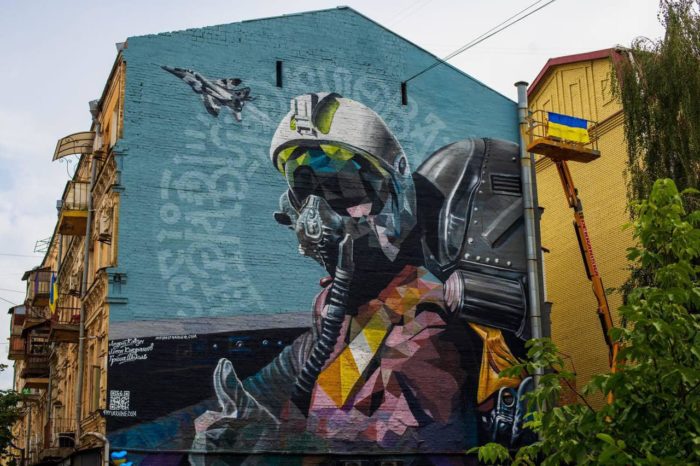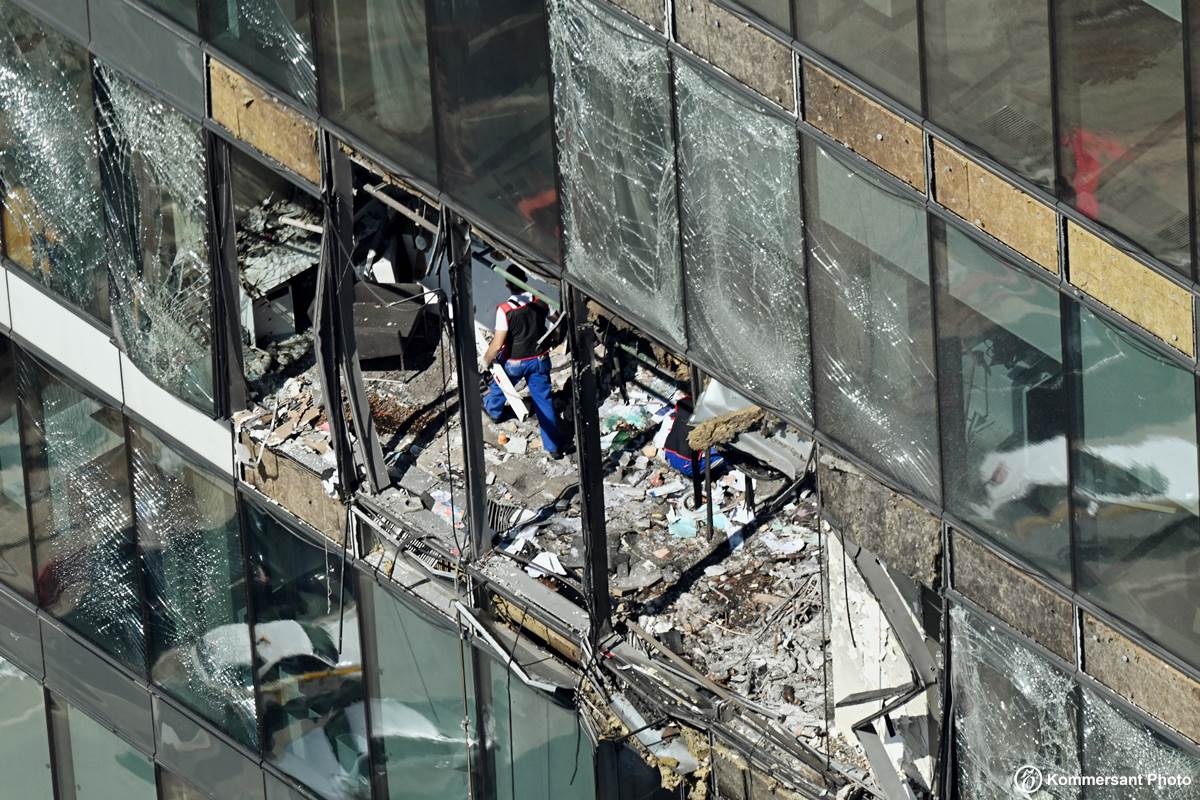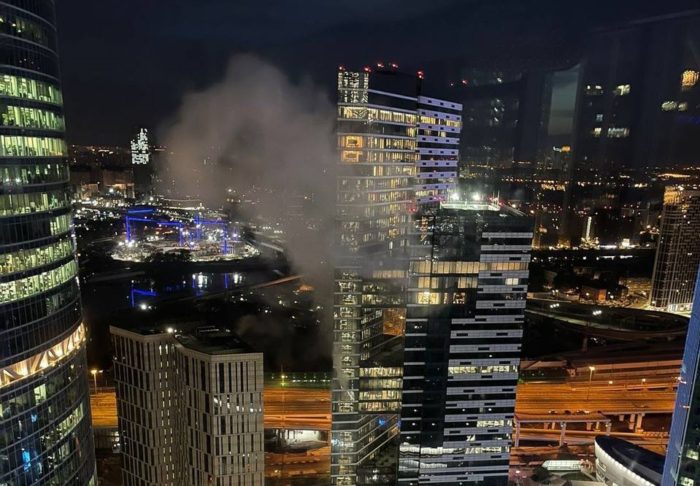Article by Jonathan E. Sweet and Mark C. Toth.
There are times when Russian President Vladimir Putin must feel like he is caught up in Henry James’ 1898 horror classic “The Turn of the Screw.” Apparitions in the form of Ukrainian drones, appearing seemingly from nowhere, are all too real and are crashing into skyscrapers in downtown Moscow.
Ukrainian President Volodymyr Zelensky’s forces are closer to planting their country’s blue and yellow flag again in Crimea than Putin ever was of planting Russia’s white, blue and red flag in Kyiv. Zelensky and his generals are proving to be masters at turning the screw and are doing so militarily, diplomatically, and psychologically.
Much has been made of Ukraine’s ghosts: the aerial legend of the “Ghost of Kyiv” and the very real snipers known as the “Ghosts of Bakhmut.” Now, Putin’s Ukrainian ghosts are becoming all too real and their cumulative devastating effect on Russian morale is impacting all levels of his regime.

facebook.com/kirill.timoshenko
Ukrainian drone strikes on Moscow — first on 24 July, then this Sunday and then again on Tuesday — were meant to create a sense that Russians are no longer safe anywhere, not even in their own capital. Russian troops, likewise, must be feeling more hemmed-in the south of Ukraine after the partial destruction two weeks ago of the Kerch Strait Bridge connecting Crimea to Russia, and ghostly images of the damaged Chonhar Strait railway bridge that connects the Ukrainian mainland to Crimea, which was struck on Saturday.
Detailed photos of Ukrainian drones attacking Moscow revealed
The isolation of Crimea and the reality that the peninsula will eventually be liberated are beginning to set in.
Zelensky’s turning of the screw is making the Kremlin nervous, and rightfully so. Kyiv’s top three — Zelensky, Gen. Valerii Zaluzhnyi, and Kyrylo Budanov — have boldly laid down gauntlets.
On 26 July, Zelensky warned, “Russian occupiers in Crimea to consider returning to Russia while the bridge built by the invaders across the Kerch Strait … is still functioning.” He added: “Crimea, like all of Ukraine, will be free — free from all Russian evil, starting with Russian missiles and ending with every Russian occupier. Russia will lose this war, and no missile will save it.”
In an interview with the Washington Post on 14 July, Zaluzhny did not mince words when commenting on Crimea: “As soon as I have the means, I’ll do something. I don’t give a damn — nobody will stop me.”
And Budanov, the head of Ukraine’s Military Intelligence, said last weekend that “the Armed Forces of Ukraine will soon enter Crimea.”
The Ukrainian offensive in the Zaporizhzhia Oblast has experienced success in Staromaiorske, Orikhiv, and Robotyne, in an apparent push towards the Sea of Azov, and deep strikes, likely from Storm Shadow missiles provided by the United Kingdom, have damaged the Chonhar Bridge, blocking any Russian attempts to withdraw to or reinforce forces from Crimea.
The second strike on the Kerch Strait Bridge on 17 July significantly disrupted traffic connecting Russia to Crimea. Between the two damaged bridges, the peninsula reportedly is becoming “untenable.” Conditions are being set via deep strikes — utilizing Storm Shadow and SCALP air-launched cruise missiles, drones, unmanned surface vessels, and partisan fighters — that are responsible for destroying ammunition storage facilities, fuel depots, and repair depots.

Drones striking buildings in Moscow at a more visceral level sends a reminder to Russian citizens that the war in Ukraine is not going well for Putin and his generals. The Russian Defense Ministry reported that one of the three drones was “destroyed over Odintsovo,” and that the other two drones “struck commercial buildings in the capital after being intercepted by Russian air defenses.”
Other Ukrainian sources suggest at least one of the drones struck a “secret Ministry of Economic Development office on the 10th floor of this skyscraper. At least six government ministries occupy this building. The offices are guarded by Putin's Federal Protective Service.”
What is not in doubt, though, is Ukraine’s operational reach. Western technology, adaptation, and ingenuity have empowered Ukraine to take the fight deep into the interior of Russia.
As Zelensky stated on Sunday,
“Ukraine is becoming stronger. Gradually, the war returns to the territory of Russia, to its symbolic centers and military bases, and this is an inevitable, natural, and absolutely just process.”
Putin evidently received the message since he promptly dispatched Defense Minister Sergei Shoigu to North Korea to secure additional weapons and ammunition from one of Russia’s arsenals of evil. Shoigu must have felt humiliated having to kiss the ring of Kim Jong Un under the cover of darkness.
Gone are the heady days of the Kremlin insisting that Putin’s limited “special military operation” was to “protect people [in the Donbas] who have been subjected to bullying and genocide.” Now, Russia disingenuously claims to be fighting for global freedom.
Russian hierarchy, under the pressure of Ukraine’s turning screws, is devolving into “woe is me” territory. During the Russia-Africa summit held in St. Petersburg last week, Russian Foreign Ministry spokeswoman Maria Zakharova lectured the assembled African leaders: “Don’t you see that our guys give their lives? Not just speak up, not just talk, but with their lives — they stand up for the right, not just of the African continent, but for all the people on the planet to be free.”
Putin must be at a loss regarding how to counter. Absent answers, the second- and third-order effects of Russian battlefield failures have been to bomb civilian targets, weaponize energy and food, and threaten nuclear retaliation — and then repeat.
Russia has returned to familiar territory. This time, in the face of a potentially successful Ukrainian counteroffensive, former Russian President Dmitry Medvedev is again resorting to nuclear saber rattling, declaring that the “NATO-backed offensive” threatens to “steal parts of Russian territory.” If that happens, Medvedev claims, it would force Moscow’s hand “to use a nuclear weapon following a decree issued by the Russian president.”
Medvedev may be the first Russian official to publicly acknowledge the possibility of the Kyiv counteroffensive succeeding. It has come full circle, and once again, Russia has assumed the role of the cornered victim.
Meanwhile, as Putin squirms, Zelensky, Zaluzhnyi, and Budanov keep turning the screw ever tighter. What would Joseph Stalin think? For that matter, what would the ghost of Peter the Great think of his wannabe successor? Putin is surely haunted by both.
- Ukraine boosts its domestic drone production
- Ukraine starts production of 500 km range drones
- Detailed photos of Ukrainian drones attacking Moscow revealed

